Texte paru dans: / Appeared in:
|
|
 |
Outil de traduction (Très approximatif) |
|
Reviewer: Fabrice Fitch Since their inception, Cinquecento have shone a light on the Imperial Habsburg court, which hitherto had warranted barely a metaphorical footnote in music history. Thanks to this Vienna-based ensemble, we now know that the court boasted some exceptional composers. First among them remains the short-lived master of the Imperial chapel, Jacobus Vaet, on whose motet is based the Missa Rex Babylonis by Johannes de Cleve (1528/29-1582). This composer coincided with Vaet in Vienna (hence, no doubt, the gesture of homage in the Mass) and retained Habsburg connections throughout his peripatetic career: two of many motets in honour of the dynasty and its adherents are included here. Cleve’s stylistic range is considerable: the Mass has solid textures and little in the way of reduced scoring. The ‘Et incarnatus’ of the Credo, a rare moment of entirely chordal writing, is specially affecting. Generally speaking, Cleve responds well to the Mass text’s more poignant passages (as the following ‘Crucifixus’ shows). That observation also holds true of the motets, which are texturally more varied. One is tempted to relate these differences to the styles of better-known figures, but that is to sell him short: in Timete Dominum and Credo quod redemptor, technical fluency is matched with accents of real poignancy, as also is the commemorative motet Carole cui nomen. As one has come to expect, Cinquecento’s singers render these touches admirably, while intricate textures are delivered with exemplary clarity. While the album’s tenor is undeniably solemn, their sonority, soft and intimate yet full, gives real pleasure. Of all their recordings devoted to ‘minor masters’, this strikes me as one of the finest. |
|




